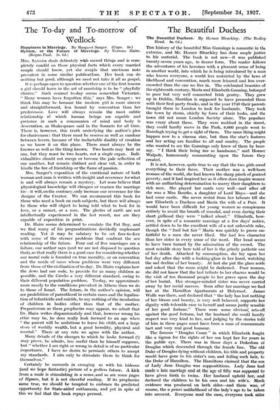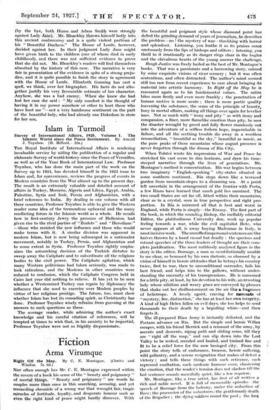The Beautiful Duchess
THE history of the beautiful Miss Cunnings is romantic in the extreme, and Mr. Horace Ble_aekley has done ample justice to his material. The book is not new—it was published twenty-seven years ago, in dearer form. The reader follows the adventures of his heroines with a pleasant sense of being in another world, into which he is being introduced by a man who knows everyone, a world less restricted by the laws of likelihood and convention, much more leisured and less over- crowded than the one we live in. The celebrated beauties of the eighteenth century, Maria and Elizabeth Gunning, belonged to poor but very well connected Irish gentry. They grew up in Dublin, Sheridan is supposed to have presented them with their first party frocks, and in the year 1740 their parentr brought them to London to look for husbands. They took the town by storm, chiefly by force of their looks, and the town did not mean London Society alone. The populace was crazy about them. They were mobbed in the street, they could hardly move in the Park, 8,000 people went to Ranelagh trying to get a sight of them. The same thing might happen now to a cinema star, but then the star's features and her acting are familiar to all and sundry. The people who wanted to see the Gunnings only knew of them by hear. say. " I think their being two so handsome," said Horace Walpole, humorously commenting upon the furore they created.
It is not, however, quite true to say that the two girls owed everything to their faces. Their mother was a well-born woman of the world, she had known the sharp pinch of genteel poverty, and it had inspired her as it often does inspire women with an unflinching determination to marry their daughters to rich men. She played her cards very well—and after all she was a Miss Bourke, a daughter of Lord Mayo—and she had some cards. She never rested from her labours till she saw Elizabeth a Duchess and Maria the wife of a Peer. It would have been difficult for young women so conspicuous entirely to avoid the breath of scandal, and even during their short girlhood they were " talked about." Elizabeth, how- ever, in spite of a romantic marriage at a few days' notice, settled down to be the excellent wife of a not unlovable rake, though the " frail but fair " Maria was quickly to prove un- faithful to a man she never liked. She had less character than her sister in every sense of the word. Her head seems to have been turned by the admiration of the crowd. The most notable story here told of her is the grimly pathetic one of her death. Attacked by consumption, she lay upon her bed day after day with a looking-glass in her hand, watching the sad decline of her beauty. At last she put the glass aside and asked that the room might be darkened. Poor woman, she did not know that the last tribute to her charms would be the visit of ten thousand people to her grave upon the day of her burial. Her stronger-minded sister was never carried away by her social success. Soon after her marriage we find her at the Hamilton Apartments at Holyrood. James Wolfe was there, and declared that " the lady has lost nothing of her bloom and beauty, is very well behaved, supports her dignity with tolerable ease to herself and seems justly sensible of her good fortune." There were some obvious', sets-oft against the good fortune, but the husband she could hardly respect was very kind to her, and judging by the stories told of him in these pages must have been a man of consummate tact and very real good humour.
The famous " Douglas Cause " in which Elizabeth fought like a tigress for the rights of her son kept her for years in the public eye. There was in those days a Dukedom of Douglas which descended through the female line. The old Duke of Douglas dying without children, his title and property would have gone to his sister's son, and failing such heir, to the Duke of Hamilton. The Hamilton claimed that the son of Lady Jane Douglas was supposititious. Lady Jane had made a late marriage and at the age of fifty was supposed to have given birth to twins. Her husband upheld her, and declared the children to be his own and his wife's. -Much evidence was produced on both sides—and there was of course, the a priori unlikelihood of the lady's age to be taken into account. Everyone read the case, everyone took sides (by the bye, both Mime. and Adam Smith, were strongly against Lady Taiie);_ .Mr, BleackleY4,/aini0.-hirriself ;hotly into
this ancient controversy and is a quite violeni partisan of his " Beautiful Duchess." The House of Lords, however, decided against her. In their judgment Lady Jane might have given birth to the children (one of whom died in early childhood), and there was not sufficient evidence to prove that she did not. Mr. Bleackley's readers will find themselves
absorbed by the history of this case. The narrative is very fair in presentation of the evidence in spite of a strong preju- dice, and it is quite possible to finish the story in agreement with the House of Lords. Elizabeth Gunning has cast a spell, we think; over her biographer. His facts do not alto. gether justify his very layourable estimate of her characthr. Anyhow, she was a bad-enemy When she kneW she had lost her case she said : -" My only comfort is the thought of having it in my power siniehoii or other to hurt thOseiv4-53 have hurt me "—not a 'very handsome sentiment on the part of the beautiful lady, wha had already one Dukedom in store for her son.











































 Previous page
Previous page